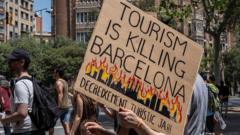In Barcelona, tensions are growing as locals march against the overwhelming influx of tourists that they say is ruining their city. The protest on Sunday saw chants of "Go Home!" directed at sightseers wandering through central streets, while demonstrators used water guns to express their discontent at couples dining in nearby cafés.
The wave of tourists flooding into the Catalan capital has sparked pushback from its residents. Many claim that the tourism boom, vital to the city's economy, has led to soaring rents and a diminished quality of life for locals. One participant, Marina, held a banner stating, "Your AirBnB used to be my home," highlighting the struggle as short-term rentals dominate the housing market.
Elena, a young marine biologist, articulated the frustration, stating, "It's not about individual tourists but how tourism is managed." As the city welcomed nearly 15 million visitors last year, nearly ten times the local population, the toll on housing and community felt unbearable.
The impact of tourism isn't just felt by the younger generation. Eighty-year-old Pepi Viu shared her plight after being evicted from her long-term home. With rent increasing by nearly 70% in her search for a new place, she lamented the absence of adequate housing for residents. "I feel like I have no protection and it's upsetting," she expressed.
Residents like Joan Alvarez are adamant about preserving their homes. With his rental contract terminated, he refuses to vacate his family's flat of 25 years, which stands out amid a sea of converted tourist accommodations. "Housing shouldn't be big business. Yes, this is his property, but it's my house," he argued.
In light of the mounting protests, the Barcelona government has announced a ban on short-term tourist rentals starting in 2028, risking the livelihoods of around 10,000 landlords. Jesus Pereda, who manages two tourist flats near major attractions, contends that landlords are being unfairly targeted for the housing crisis. He attributes high rents to the influx of 'digital nomads' rather than to tourism itself, stressing that without tourist income, the city's economy would face dire consequences.
The protests culminated in dramatic scenes, including fireworks and clashes near the Sagrada Familia, where tensions with law enforcement were palpable. The sentiment against over-tourism isn't confined to Barcelona, as similar protests arose across Spain, Portugal, and Italy, illustrating a widespread struggle for housing amid tourism's coexistence with local communities.
With summer fast approaching and expectations for more tourists than ever, the challenge remains to find a sustainable and equitable path forward for both tourists and the residents of Barcelona.
The wave of tourists flooding into the Catalan capital has sparked pushback from its residents. Many claim that the tourism boom, vital to the city's economy, has led to soaring rents and a diminished quality of life for locals. One participant, Marina, held a banner stating, "Your AirBnB used to be my home," highlighting the struggle as short-term rentals dominate the housing market.
Elena, a young marine biologist, articulated the frustration, stating, "It's not about individual tourists but how tourism is managed." As the city welcomed nearly 15 million visitors last year, nearly ten times the local population, the toll on housing and community felt unbearable.
The impact of tourism isn't just felt by the younger generation. Eighty-year-old Pepi Viu shared her plight after being evicted from her long-term home. With rent increasing by nearly 70% in her search for a new place, she lamented the absence of adequate housing for residents. "I feel like I have no protection and it's upsetting," she expressed.
Residents like Joan Alvarez are adamant about preserving their homes. With his rental contract terminated, he refuses to vacate his family's flat of 25 years, which stands out amid a sea of converted tourist accommodations. "Housing shouldn't be big business. Yes, this is his property, but it's my house," he argued.
In light of the mounting protests, the Barcelona government has announced a ban on short-term tourist rentals starting in 2028, risking the livelihoods of around 10,000 landlords. Jesus Pereda, who manages two tourist flats near major attractions, contends that landlords are being unfairly targeted for the housing crisis. He attributes high rents to the influx of 'digital nomads' rather than to tourism itself, stressing that without tourist income, the city's economy would face dire consequences.
The protests culminated in dramatic scenes, including fireworks and clashes near the Sagrada Familia, where tensions with law enforcement were palpable. The sentiment against over-tourism isn't confined to Barcelona, as similar protests arose across Spain, Portugal, and Italy, illustrating a widespread struggle for housing amid tourism's coexistence with local communities.
With summer fast approaching and expectations for more tourists than ever, the challenge remains to find a sustainable and equitable path forward for both tourists and the residents of Barcelona.



















